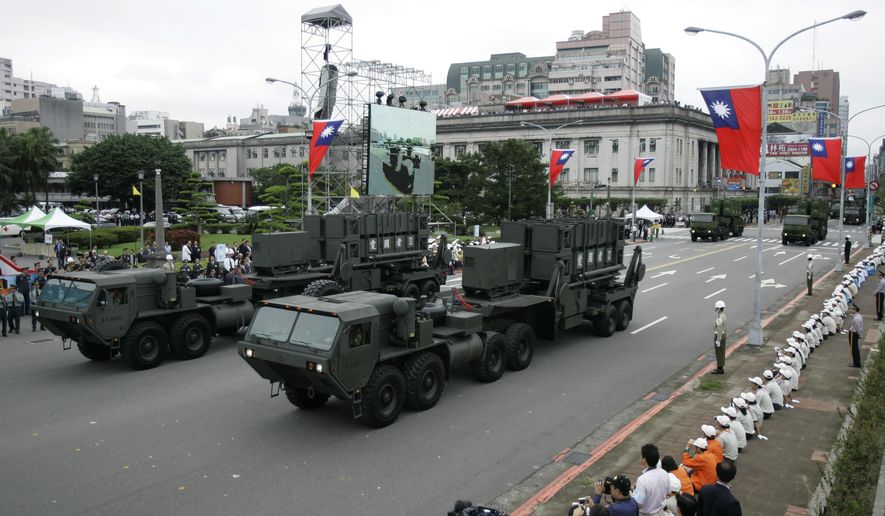President Biden said Monday that the U.S. would get involved militarily if China invades Taiwan, a blunt statement that went beyond the “strategic ambiguity” that previous presidents have employed in talking about the island nation, which Beijing considers a breakaway province.
The White House quickly clarified that the U.S. was not changing its policy.
Mr. Biden raised eyebrows when a reporter in Tokyo compared the situation to the Russian invasion of Ukraine.
“You didn’t want to get involved in the Ukraine conflict militarily for obvious reasons,” the reporter said. “Are you willing to get involved militarily to defend Taiwan if it comes to that?”
“Yes,” Mr. Biden said at a press conference with Japanese Prime Minister Fumio Kishida.
“You are?” the reporter asked.
SEE ALSO: Biden says Taiwan policy has not changed, one day after dust-up
“That’s the commitment we made,” the president said.
The 1979 Taiwan Relations Act does not require the U.S. to intervene if China invades. Instead, it calls for America to provide assistance so Taiwan can defend itself.
Chinese Foreign Ministry spokesperson Wang Wenbin rebuked Mr. Biden.
“China expresses strong dissatisfaction and firm opposition to the remarks by the U.S. side. There is but one China in the world,” he said. “China will take firm actions to safeguard its sovereignty and security interests. We mean what we say.”
He said China “has no room for compromise” on “national sovereignty and territorial integrity.”
U.S. presidents typically have trodden a narrow line in promoting Taiwan’s right to self-governance without provoking China, a superpower in Asia.
During the press conference, Mr. Biden said the U.S. supports the “one-China policy,” but that does not mean “China has the jurisdiction to go in and use force to take over Taiwan.”
The White House pointed to that section of Mr. Biden’s remarks in a statement that was swiftly sent to many news outlets and was viewed as a walk-back of Mr. Biden’s comments.
“As the president said, our policy has not changed,” the White House said. “He reiterated our One China Policy and our commitment to peace and stability across the Taiwan Strait. He also reiterated our commitment under the Taiwan Relations Act to provide Taiwan with the military means to defend itself.”
Mr. Biden is using his first presidential tour of Asia to give a tacit signal to China that it should not interfere in Taiwan the way Russia invaded Ukraine.
He said China is “already flirting with danger right now by flying so close and all the maneuvers they are undertaking.”
Any Chinese effort to take Taiwan by force, he said, is “just not appropriate” and would “dislocate the entire region and be another action similar to what happened in Ukraine.”
“My expectation is it will not happen, it will not be attempted,” Mr. Biden said.
Some critics at home gave Mr. Biden kudos for his remarks. Members of both major political parties are jockeying to prove they are tough on China and will work to defend Taiwan against Beijing’s aggression in the South China Sea.
Hugh Hewitt, a conservative commentator, said Mr. Biden committed the U.S. to the island’s defense. “His staff may not be happy with him but bravo @POTUS,” he tweeted. “It needed saying, and it needed saying without ambiguity.”
Sen. Tom Cotton, Arkansas Republican, said the president should lean into the apparent shift from strategic ambiguity to “strategic clarity.”
“Given President Biden’s apparent policy shift in off-the-cuff remarks at a press conference in Japan, followed by anonymous White House aides trying to ‘walk back’ his statement, it’s now essential that President Biden restate our new policy of strategic clarity in clear, deliberate remarks from a prepared text,” Mr. Cotton said. “Otherwise, the continued ambiguity and uncertainty will likely provoke the Chinese communists without deterring them — the worst of both worlds.”
Some analysts expressed the same fear.
“President Biden’s consistent mischaracterization of the Taiwan Relations Act threatens to undermine American deterrence rather than strengthen it,” said Craig Singleton, a senior China fellow at the nonpartisan Foundation for Defense of Democracies.
“President Biden’s repeated gaffes about Taiwan — this being the fifth on record — carry real-world consequences,” he said, referring to four flubs during the presidency and one during the campaign. “Sooner or later, Beijing may assess that these repeated gaffes are, in fact, intentional, which could lead to a serious escalation between the two superpowers, one that Washington may or may not be prepared for.”
He said strategic ambiguity is the “least bad” option for the U.S. because it keeps China guessing about the scope of a U.S. response to an attack on Taiwan, “which in turn leads Chinese war planners to make worst-case assumptions regarding U.S. resolve.”
Defense Priorities, a libertarian-leaning organization that advocates against military entanglements abroad, said “it is exceedingly risky for the president to abandon ‘strategic ambiguity’ and imprudent to even hint at it, particularly in offhand remarks.”
“Unlike Japan, Taiwan is not an ally of the United States. That is by design, and there is no compelling U.S. vital interest with respect to the island, which China has claimed since 1949, that would justify a U.S.-China war,” said Lyle Goldstein, director of Asia Engagement. “The risks of a war between the U.S. and nuclear-armed Russia limit our involvement in Ukraine; the same risks and dynamics should guide our Taiwan policy as well.”
• Tom Howell Jr. can be reached at thowell@washingtontimes.com.




Please read our comment policy before commenting.